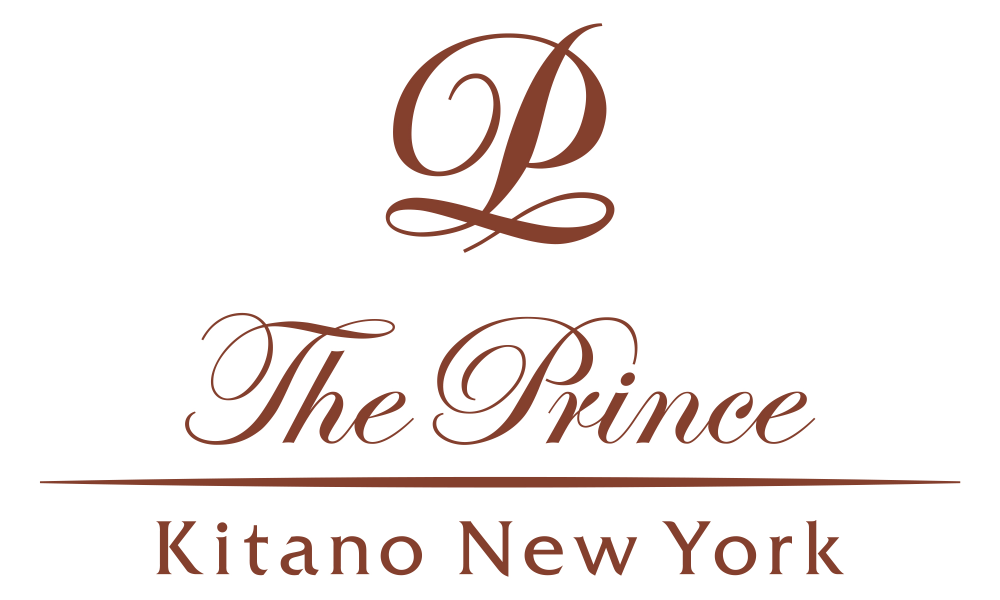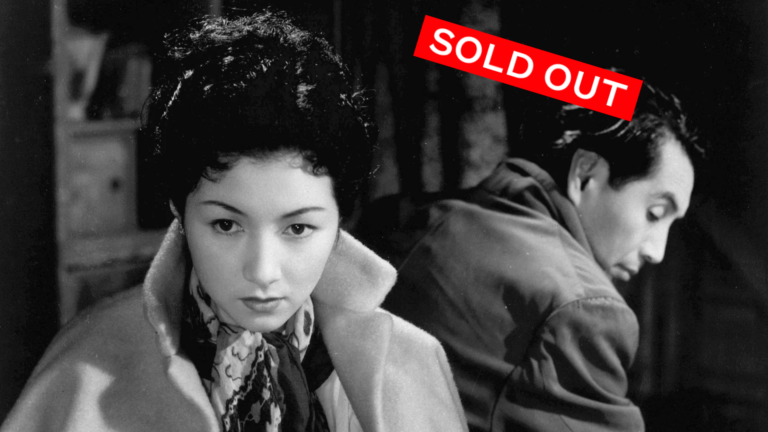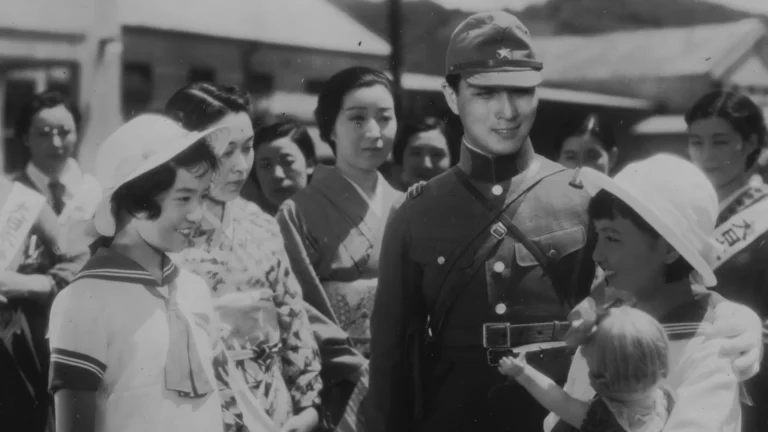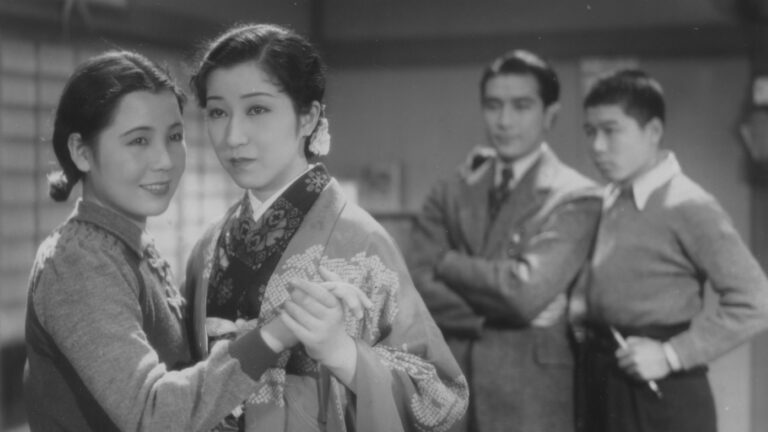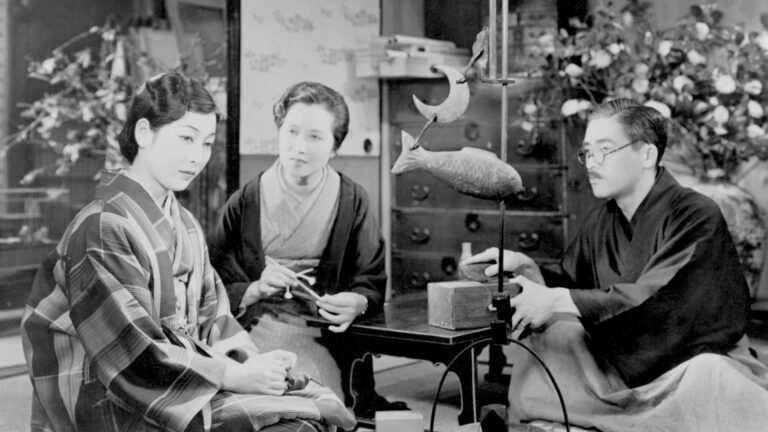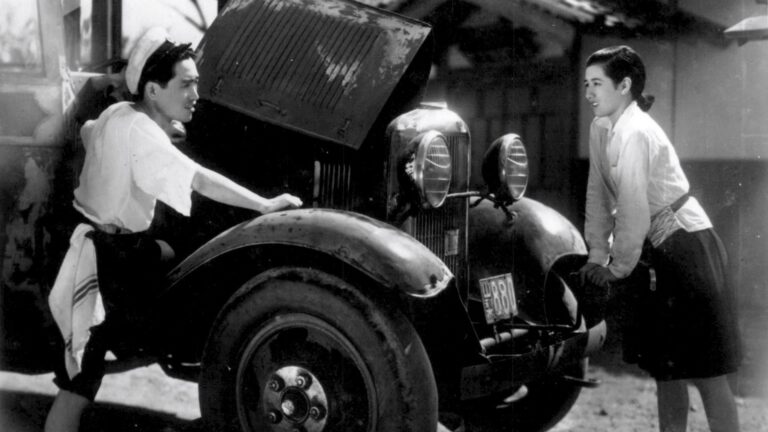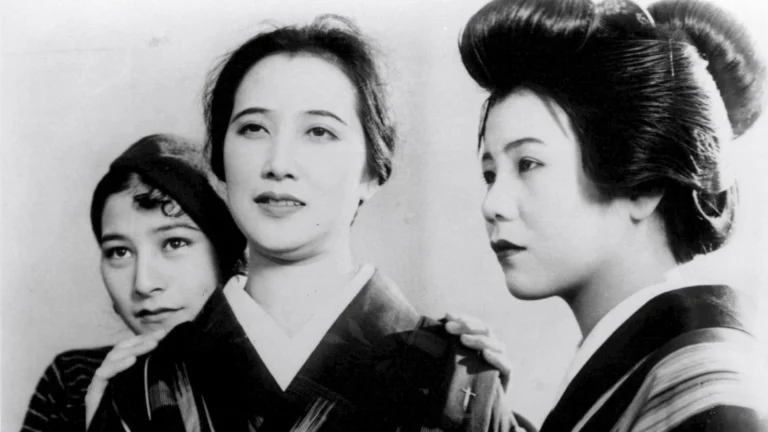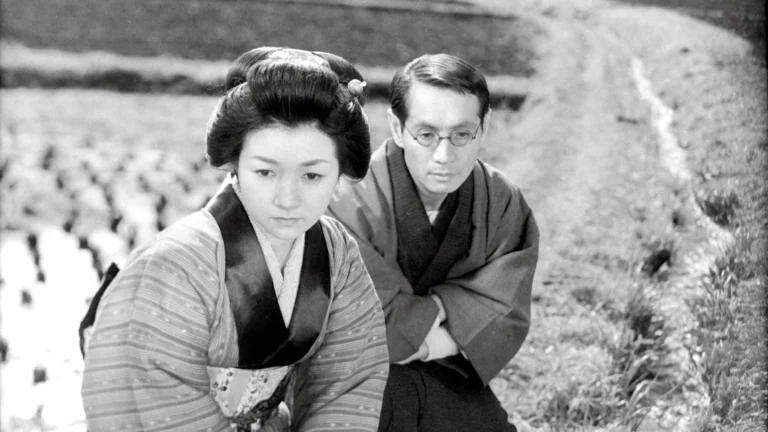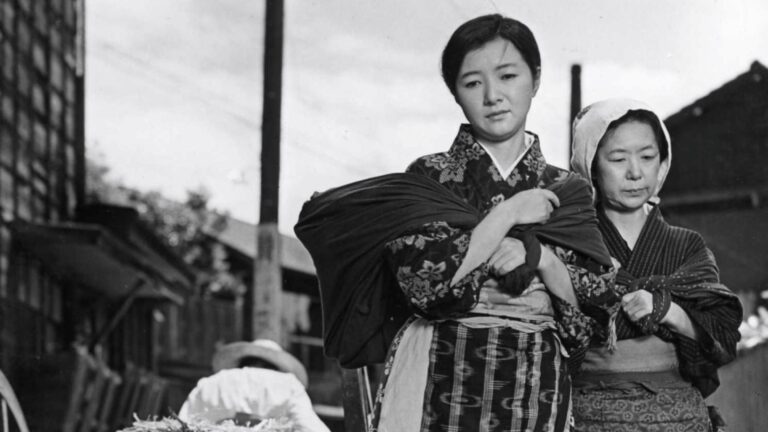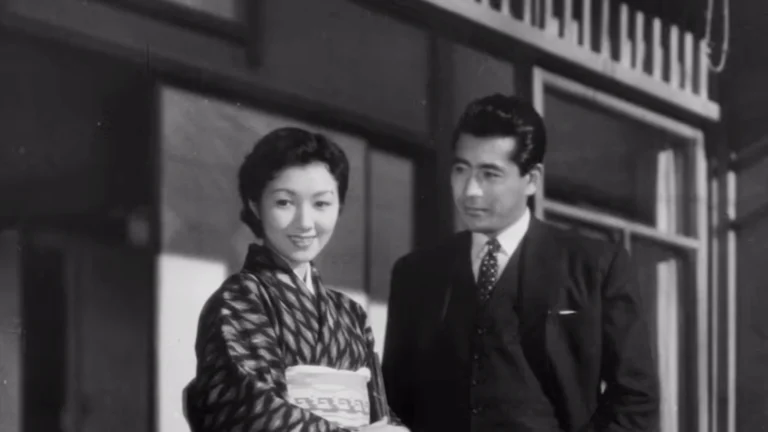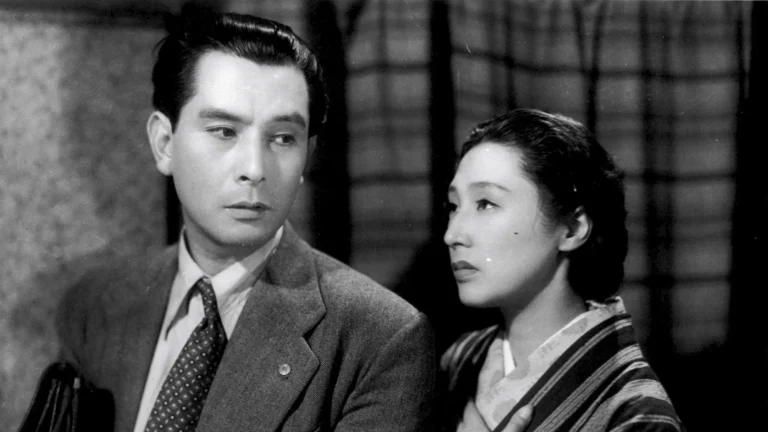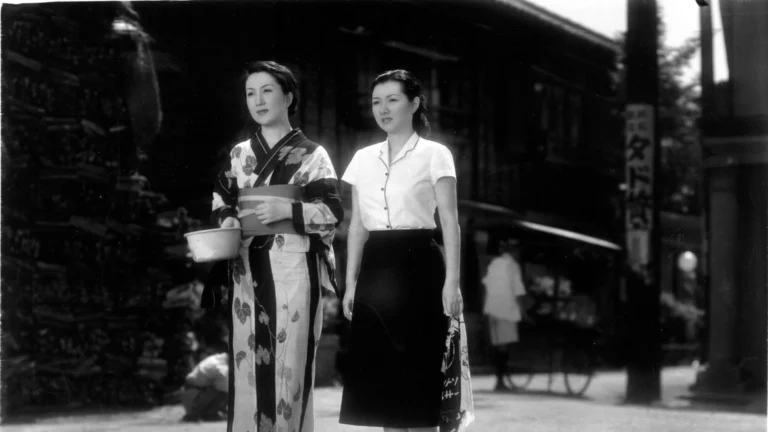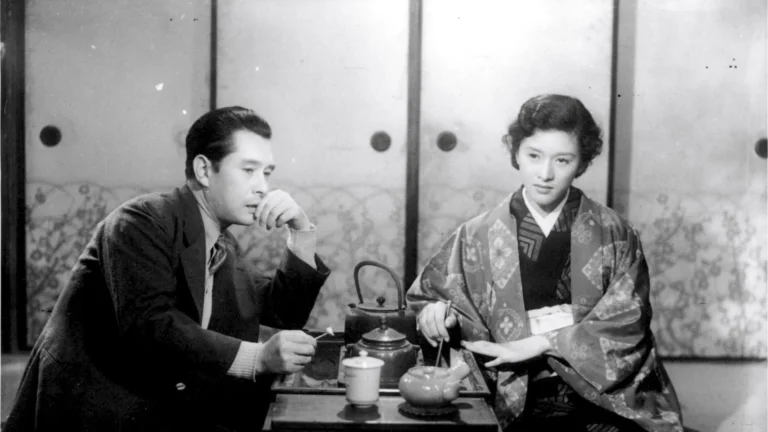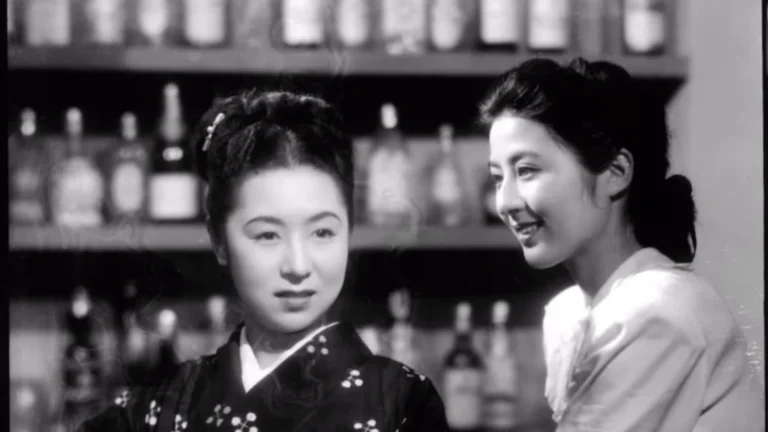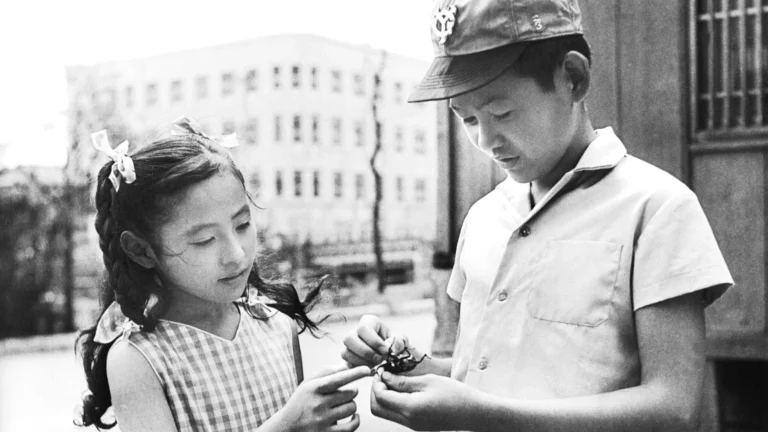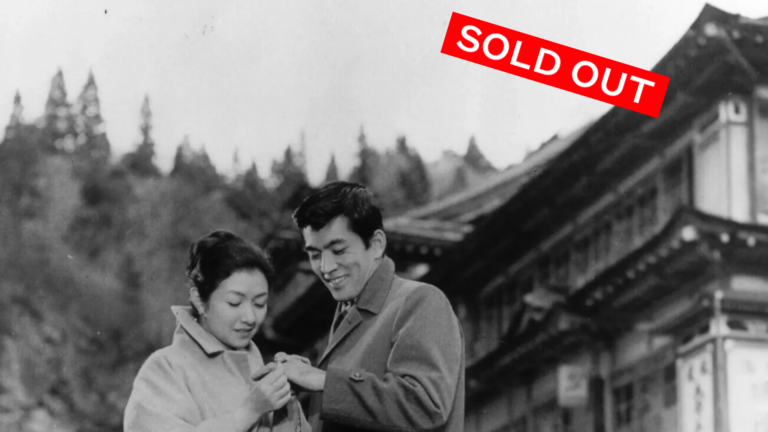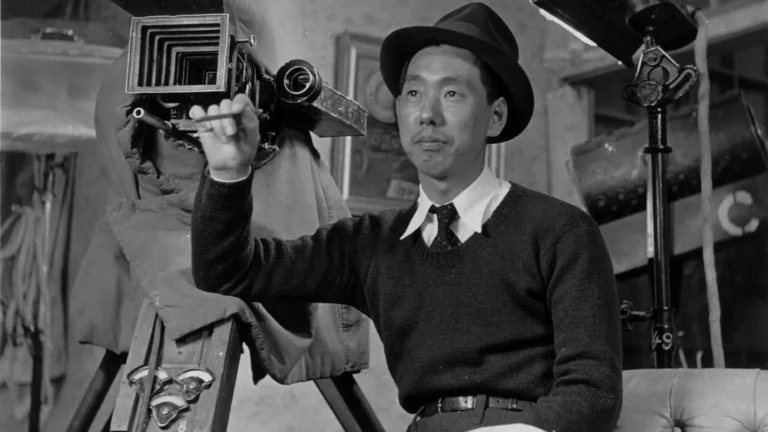Mikio Naruse: The World Betrays Us – Part I

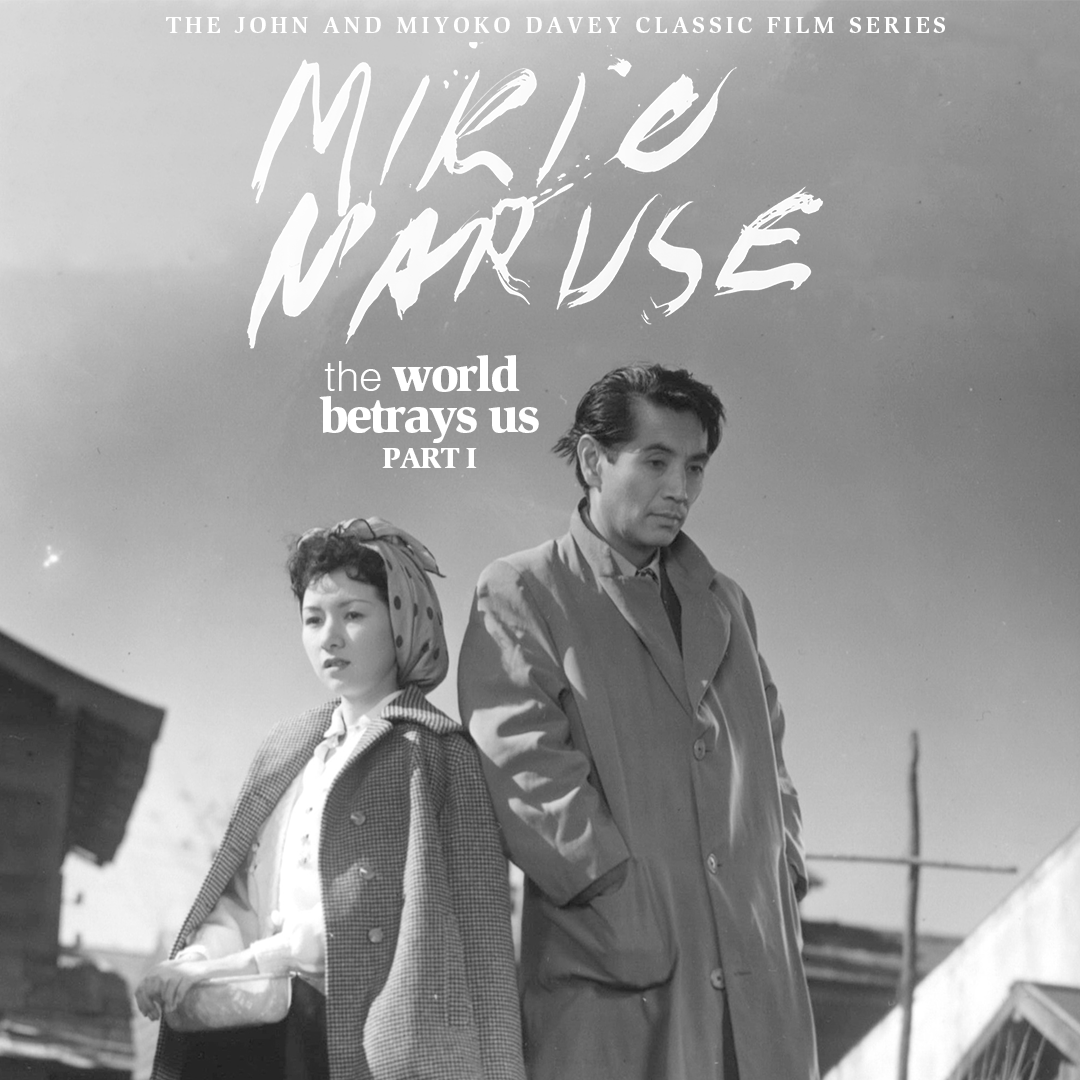
The John and Miyoko Davey Classic Film Series
Mikio Naruse: The World Betrays Us – Part I
May 9—31, 2025
Often cited as the “fourth great master” of Japanese cinema, Mikio Naruse (1905-1969) crafted an austere world across his four-decade career, excavating the lives of women and the milieu of Japan’s working class, accentuated by his profound sense of despair. Once dismissed by critics as a “poor man’s Ozu”, the prolific studio craftsman would share some close thematic sensibilities with his contemporary early on, but his bleak realities and subtle style, informed by his own impoverished upbringing, would elucidate his pessimist beliefs. A longtime director for Toho, where his notoriously taciturn persona would earn the nickname “Yaruse Nakio” or Mr. Disconsolate, Naruse became a renowned master of the shoshimin eiga (common people’s drama) and was lauded as one of the great directors of women.
The currents of Naruse’s cinema course through the constraints and deceptions of contemporary society, displaying the deep sorrows and failures found in life. Perhaps no more brilliantly exemplified than through his extensive collaborations with actress Hideko Takamine and kinship with the writings of Fumiko Hayashi, Naruse’s heroines reflect the personal histories of common women—mothers, daughters, wives—in Japan’s developing modernity, bringing an earth-shattering humanity to their troubles; one encircled by marital discord, deceitful men, economic disparity and a ruthlessly gendered society.
Japan Society first presented a retrospective of Naruse’s work in 1973—then noted as the “first film series ever devoted exclusively to the work of Naruse”—and again in 1984 with the Museum of Modern Art. Today, in concert with Metrograph and The Japan Foundation, New York, we are proud to once again commemorate this golden age master on the 120th anniversary of his birth with his first New York retrospective in 20 years.
Co-organized with Metrograph and The Japan Foundation, New York
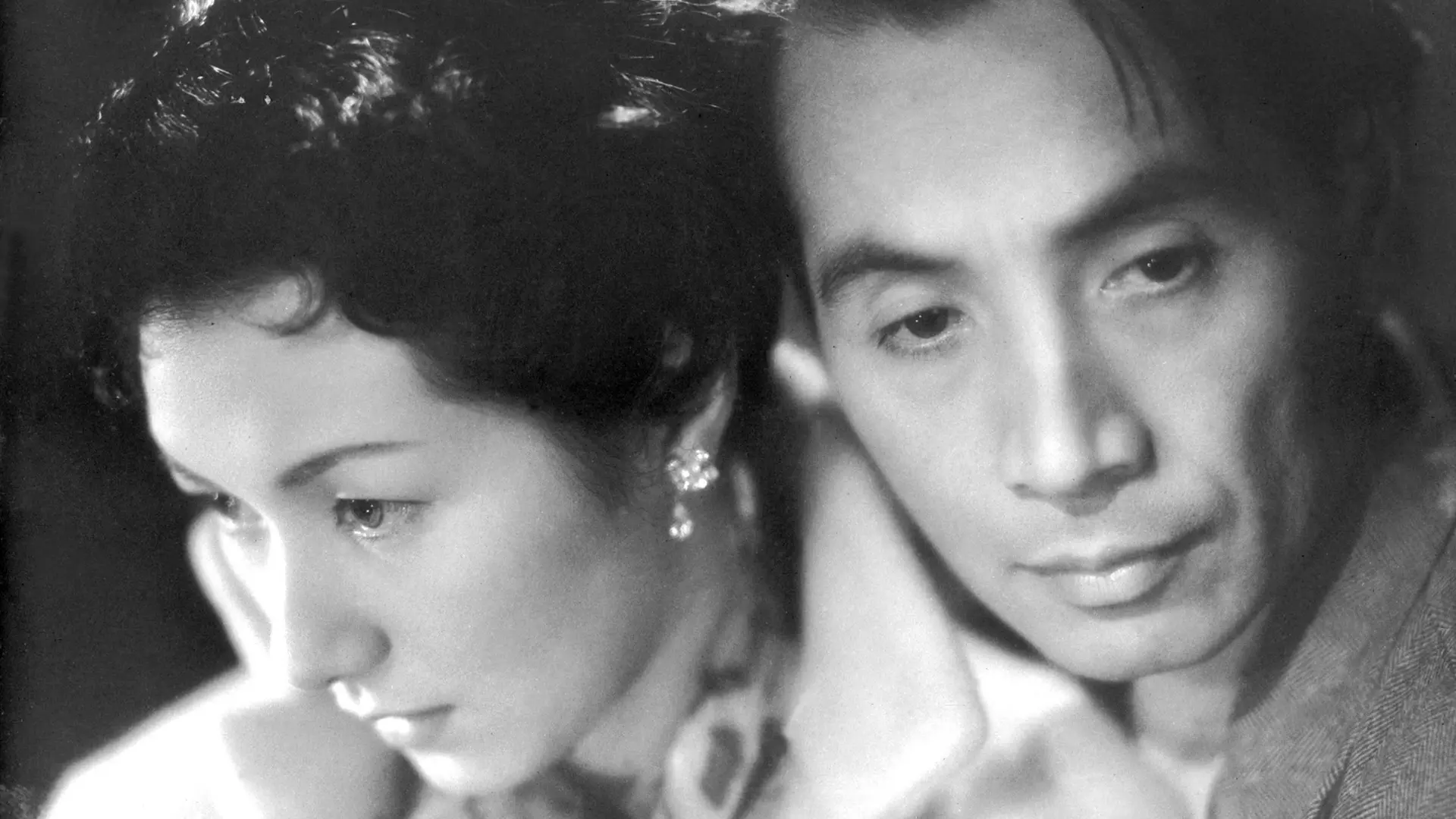
Admission Information
Tickets
Floating Clouds with Reception: $20 / $16 members
All Other Screenings: $16 / $12 members
All-Access Pass: Get tickets for all Japan Society’s Mikio Naruse: The World Betrays Us – Part I screenings at a discounted price.
$135 for the public / $105 for Japan Society members. Buy Now
Prices are inclusive of fees, where applicable. All in-person screenings will take place in Japan Society’s auditorium, located at 333 E. 47th Street in New York, NY.
Full Lineup
Floating Clouds
70th Anniversary—Imported 35mm Print. Set in the devastating reality of postwar Japan, Naruse’s hailed masterpiece adapts Fumiko Hayashi’s final completed novel, tracing the lives of two repatriated lovers who recommence their wartime affair, propping up the vestiges of their long-lost passion in the fading memory of what once was.
1955. 123 min. Directed by Mikio Naruse.
Sincerity
Imported 35mm Print. Two classmates discover their parents’ complicated histories in this wartime home drama. Capturing the lyrical beauty of sunlit pastorals, Sincerity leaves the adult drama on the periphery as Naruse pivots to the children’s reactions, evoking their perceptions of the crisis which follows.
1939. 67 min. Directed by Mikio Naruse.
A Woman’s Sorrows
Imported 35mm Print. Set in the cosmopolitan stretches of a westernized Tokyo, a conservative girl’s marriage into an affluent family brings contradictions to light as she finds herself locked away like a “doll” and practically treated like a housemaid. Naruse crafts a class drama “of portraying conflicts that… have not yet erupted and become irreversible.”
1937. 74 min. Directed by Mikio Naruse.
Wife! Be Like a Rose!
Imported 35mm Print. The first Japanese talkie to be screened in New York—and one of the earliest Japanese films to be theatrically released in the United States—Naruse’s early masterpiece is a playful comedy with experimental leanings, focusing on a modern girl’s journey to retrieve her estranged father in preparation for her marriage.
1935. 74 min. Directed by Mikio Naruse.
Hideko the Bus Conductress
Imported 35mm Print. Light in tone and reminiscent of Shimizu’s Mr. Thank You, particularly for its provincial airs and relaxed plotting, Naruse’s wartime production marks the director’s first collaboration with Hideko Takamine who stars as a radiant young ticket-taker trying to save her employer’s struggling bus operation.
1941. 54 min. Directed by Mikio Naruse.
Three Sisters with Maiden Hearts
Imported 35mm Print. The first of Naruse‘s P.C.L productions (a predecessor of Toho) after his departure from Shochiku as well as his first sound film, Three Sisters with Maiden Hearts finds three sisters, raised as street performers, reuniting as life’s cruel sense of irony orchestrates an unduly procession of misfortune in Naruse’s first Kawabata adaptation.
1935. 75 min. Directed by Mikio Naruse.
Untamed
Imported 35mm Print. Akin to Mizoguchi’s The Life of Oharu in its spanning examination of a woman’s life through ill fortune and a succession of suitors and lovers, Untamed finds Hideko Takamine undergoing the role of boisterous, outspoken Oshima—a woman “who refuses to believe it is a man’s world,” and resists every inch of the rigid and codified ways of society.
1957. 121 min. Directed by Mikio Naruse.
A Wanderer’s Notebook
Imported 35mm Print. A final tribute to feminist novelist Fumiko Hayashi (1903-1951) whose writings would form the basis of many of Naruse and Takamine’s greatest collaborations (Floating Clouds, Repast), Naruse undertakes a mythologizing of Hayashi’s life through the adaptation of her autobiographical novel.
1962. 123 min. Directed by Mikio Naruse.
A Wife’s Heart
Imported 35mm Print. A domestic drama revolving around the interpersonal lives of a family household and their failing business, A Wife’s Heart belongs to Naruse’s cycle of marriage films. Focusing on distant couple Kiyoko and Shinji, Naruse examines what the heart desires, revealing the hopelessness of marriage and its duty-bound obligations which hold nothing but empty promises and broken dreams.
1956. 98 min. Directed by Mikio Naruse.
Wife
Imported 35mm Print. The fourth of Naruse’s Fumiko Hayashi adaptations, Wife finds married life at an impenetrable impasse as housewife Mineko and husband Toichi’s 10-year marriage is reduced to a barely tolerated co-existence.
1953. 96 min. Directed by Mikio Naruse.
Lightning
Imported 35mm Print. Facing pressures to marry, sightseeing bus guide Kiyoko strives for her own solitary independence in this faithful Fumiko Hayashi adaptation. A buildup of vignettes, events and occurrences, Lightning finds Kiyo being suffocated by her family life, trying to make sense of a modern existence where the promise of happiness still comes secondary for women.
1952. 87 min. Directed by Mikio Naruse.
Husband and Wife
Imported 35mm Print. Originally envisioned as a sequel to Repast until Setsuko Hara fell ill, Husband and Wife recast Yoko Sugi opposite Ken Uehara’s predictably apathetic husband. A married couple’s move in with a widower reveals the growing rifts and dissatisfactions of married life.
1953. 87 min. Directed by Mikio Naruse.
Ginza Cosmetics
Imported 16mm Print. Often pinpointed as the beginning of Naruse’s career revival, Ginza Cosmetics employs an almost neo-realist attitude with its lightly-traced plot, chronicling several days in the life of an aging bar hostess. Loosely inspired by a Fumiko Hayashi story, Ginza Cosmetics anticipates When a Woman Ascends the Stairs as it forages the nightworlds of postwar Japan.
1951. 87 min. Directed by Mikio Naruse.
The Approach of Autumn
Imported 35mm Print. An uncharacteristic departure from Naruse’s typical concentration on the lives of adults, The Approach of Autumn fixates on young Hideo, a boy whose arrival to Ginza from the countryside formulates the beginnings of a forced adolescence, marked by the misgivings brought on by his mother’s choices.
1960, 79 min. Directed by Mikio Naruse.
Yearning
Imported 35mm Print. Quiet passions erupt from within in Naruse’s late period masterpiece, a sumptuous melodrama of undulating and repressed feeling. Scripted by Takamine’s husband Zenzo Matsuyama, Yearning finds devastating power in its tragic underpinnings when the younger brother-in-law of a widow professes his love.
1964. 98 min. Directed by Mikio Naruse.
Talk
Naruse Mikio: The Auteur as Salaryman
Free Talk. Naruse scholar Catherine Russell, writer of The Cinema of Naruse Mikio: Women and Japanese Modernity, presents a talk on the filmmaker and his work.
Lecture. Approx. 40 min.
Top & Inset Images: © 1955 Toho Co., Ltd.
Organized by Alexander Fee, Film Programmer, Japan Society; Edo Choi, Film Programmer, Metrograph; and Akinaru Rokkaku, The Japan Foundation, New York.
Special Thanks to Kate MacKay (BAMPFA); Mako Fukata; Akinaru Rokkaku & Shun Inoue (The Japan Foundation, New York); Haden Guest (Harvard Film Archive); Brian Belovarac (Janus Films); Miki Zeze (Kadokawa); Rikako Kosugiyama (National Film Archive of Japan); Catherine Russell;Tony Stella; Shion Komatsu & Go Onishi (Toho Co., Ltd.).
Mikio Naruse: The World Betrays Us is co-organized by Japan Society, Metrograph and The Japan Foundation, New York.
Mikio Naruse: The World Betrays Us – Part I is generously supported by The John and Miyoko Davey Endowment Fund for Classic Japanese Film.
Japan Society’s 120th anniversary initiatives and related programs are generously supported by Champion Sponsor, MUFG Bank, Ltd.; Advocate Sponsor, Mizuho Americas; and Friend Sponsor, Mitsubishi Corporation (Americas).

Japan Society programs are supported by the New York State Council on the Arts with the support of the Office of the Governor and the New York State Legislature.

Film programs are generously supported by ORIX Corporation USA, public funds from the New York City Department of Cultural Affairs in partnership with the City Council, Anime NYC and Yen Press. Endowment support is provided by the Lila Wallace-Reader’s Digest Endowment Fund and The John and Miyoko Davey Endowment Fund. Additional season support is provided by The Globus Family, George P. Hirose, David Toberisky, Joseph Rajaratnam and Dharshini Iolanthe Sivakumaran, and other Film supporters.
Transportation assistance is provided by Japan Airlines, the official Japanese airline sponsor of Japan Society Film Program. Housing assistance is provided by the Prince Kitano New York, the official hotel sponsor of Japan Society Film Program.

